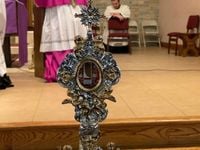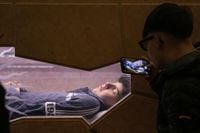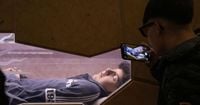In a remarkable intersection of faith and commerce, Italian prosecutors have launched an investigation into the illegal online sale of alleged relics belonging to Blessed Carlo Acutis, who is set to become the first millennial saint next month. The inquiry by the Perugia Public Prosecutor’s Office was initiated following a formal complaint from Bishop Domenico Sorrentino of Assisi, the town where Acutis’ tomb is located and open for public veneration.
On March 26, 2025, Bishop Sorrentino expressed grave concerns about the existence of an online marketplace for relics, stating, "On the internet, there is a marketplace for relics concerning various saints, such as our St. Francis, complete with a price list. Something impossible to accept." The bishop’s alarm was particularly triggered when he discovered that an alleged first-class relic of Acutis’ hair had been auctioned online for 2,000 euros by an anonymous seller.
"We do not know whether the relics are real or fake," Sorrentino remarked. "But if it were also all fabricated, if there was deception, we would be not only in the midst of a fraud but also of an insult to religious belief." According to canon law within the Catholic Church, the sale of first- and second-class relics is strictly prohibited, as these items can only be given away by their rightful owners. Significant relics, such as parts of the body, require explicit permission from the Vatican to be transferred.
Acutis’ canonization Mass is scheduled to take place in St. Peter’s Square on April 27, 2025, coinciding with the Church’s Jubilee of Teenagers, a fitting backdrop for the celebration of a young man whose life and legacy resonate deeply with today’s youth.
As the date approaches, Assisi has seen an influx of pilgrims eager to pay their respects to Acutis, the first millennial saint who died at the tender age of 15 in 2006 from leukemia. More than a million pilgrims have visited his shrine over the past year, drawn by his vibrant spirit and the compelling narrative of his faith.
Maria Rosario Riccio, an educator visiting Acutis’ shrine with a large group of parish youth, noted, "St. Francis, St. Clare, of course, important saints who marked an epoch – but that’s far removed from today’s teens. Carlo is like the kids. He’s a near-saint of our time, who can show teens that it’s possible to love Jesus while being a regular youth." This sentiment reflects the unique appeal of Acutis, who is often described as relatable and inspiring.
His mother, Antonia Salzano Acutis, emphasized her son’s ordinary yet extraordinary nature, stating, "Carlo wasn’t an alien, he was a normal person. But if it’s illuminated by the light of Christ, a life becomes extraordinary." She recounted how he often expressed a desire to help others, from standing up for bullied classmates to feeding the homeless. Acutis’ legacy is also marked by his technological savvy; he created a website dedicated to Eucharistic miracles, which has been utilized in parishes worldwide.
In a twist of fate, the relics of Acutis have become a point of contention, with various items being sold online, including a lock of his hair that fetched £2,000. This has sparked an international scramble among collectors and devotees, further complicating the investigation into the authenticity of these relics. The bishop’s complaint has led to fears that many of these items might be fraudulent, a concern echoed by many within the Church.
"These auctions are not only potentially fraudulent but are also profoundly disrespectful towards the Church," Sorrentino stated, reinforcing the need for vigilance in protecting the sanctity of Acutis’ legacy.
Despite the controversies surrounding the sale of relics, the devotion to Acutis continues to grow. His preserved body, displayed at the Sanctuary of the Spoliation in Assisi, has become a focal point for thousands of visitors. Acutis’ mother shared a poignant memory, stating, "He was a computer genius, so this probably makes him very close to the people of nowadays." His relatable nature and the way he lived his faith resonate with a generation increasingly distanced from organized religion.
Acutis is often referred to as "God's influencer" and is recognized as the patron saint of the internet due to his efforts in promoting his faith online. His influence has transcended borders, with his relics touring across various countries, including the United States, Ireland, and India. The Vatican has confirmed two miracles attributed to his intercession, including the healing of a Costa Rican student who recovered from a serious bike accident after her mother prayed at his casket.
As the canonization date draws near, the excitement surrounding Acutis continues to grow. The Church anticipates that his elevation to sainthood will not only honor his memory but also inspire a renewed interest in faith among young people. His story serves as a reminder that holiness can be found in the everyday lives of ordinary individuals.
In the face of challenges, Carlo Acutis’ legacy remains a beacon of hope and faith for countless individuals. His life story exemplifies the potential for goodness and faith in the modern world, and as he is canonized, many believe he will continue to inspire future generations.







